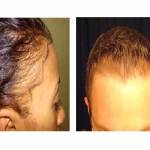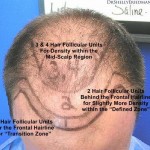Hereditary Male Pattern Baldness Taboos You Should Break
Hereditary male pattern baldness
or androgenetic alopecia, is a condition that occurs in 4 out of 7 males and has been known to strike as early as the end of puberty. Male’s that exhibit hereditary male pattern baldness often feel ashamed of their thinning hair and seek methods of treatment to either prevent further hair loss, or even regrow lost hair.
Understanding the reasons behind this condition, both theoretically evolutionary and hormonal, as well as the possible treatment options, can give some men the understanding that they are not alone, and that many are seeking methods of combating the baldness gene. This information can be vital to those that find their baldness a part of their lives they would rather do without.
While there is no agreement between scientists regarding the evolutionary reasons behind hereditary male pattern baldness, studies on appearance have tested the presence of baldness and it’s affect on perception within several cultures. The resounding cultural answer is that baldness signifies maturity, and many scientists and anthropologists take this to mean that baldness continues to be displayed via evolutionary means as a way of conveying maturity and authority.
This hypothesis of maturity gains more ground when the hormonal causes of hereditary male pattern baldness are discussed. A powerful male hormone, dihydrotestosterone-or DHT-is the active agent behind the shrinking of follicles in the areas associated with male pattern baldness.
This hormone works on affected follicles by slowly shrinking the width of hair produced, until it either disappears or is shrunk to a barely perceptible size. DHT also strongly drives male impulse and has powerful effects on sex drive and authoritative behavior.
Male pattern baldness treatment often works by mitigating the effect of DHT on the affected areas. This is most pronounced as a method to prevent the loss of hair, but in some cases hair regrowth does occur. The current FDA supported means of treating male pattern baldness include Folliform DHT Blocker and Minoxidil
, which are available in a wide assortment of different individual medications.
For those who cannot afford treatment, whom treatment does not work for, or those that simply dislike the option of requiring medication, baldness onset can have a variety of psychological and social effects. Many men decide to view their baldness as a unifying quality, and can identify with other bald celebrities that are renowned for their lack of hair. Other men find that it reduces their capacity to be confident amongst other, especially younger, males






Leave a Reply